The Global Fund, an international organization fighting deadly diseases like AIDS, TB and Malaria, has said that climate change is hampering efforts to control these dangerous infectious diseases.
In the report for the year 2023, the World Organization has said that although the efforts made against these three deadly infectious diseases have returned to the old level after the Covid-19, but climate change and the ongoing conflict and war situation in different regions by 2030 AIDS, T. B and has become a major challenge towards the goal of eliminating malaria.
According to a report by The Global Fund, environmental or climatic changes are contributing to the spread of malaria. Those areas of the continent of Africa which were safe from malaria due to extreme cold are now seeing the spread of this disease due to increasing temperature.
Along with this, frequent floods and storms due to climate change are not only causing an increase in infectious diseases but also affecting the provision of medical services in the affected areas.
According to the report of the World Organization, due to the situation of civil war and internal conflict in areas such as Sudan, Ukraine, Afghanistan and Myanmar, it has become difficult for medical workers to reach the affected populations, as a result of which many populations here have not received treatment. Deprived of convenience.
However, despite all these obstacles and difficulties, some important achievements have been achieved in the fight against these dangerous diseases. In 2022, 6.7 million TB patients were treated under the Global Fund. This number is 14 lakh patients more than in 2021.
Last year, the Global Fund provided treatment to nearly 2.5 million people living with HIV, and distributed 22 million mosquito nets to control the spread of malaria.
(function(d, s, id){
var js, fjs = d.getElementsByTagName(s)[0];
if (d.getElementById(id)) {return;}
js = d.createElement(s); js.id = id;
js.src = “//connect.facebook.net/en_US/sdk.js#xfbml=1&version=v2.3&appId=770767426360150”;
fjs.parentNode.insertBefore(js, fjs);
}(document, ‘script’, ‘facebook-jssdk’));
(function(d, s, id) {
var js, fjs = d.getElementsByTagName(s)[0];
if (d.getElementById(id)) return;
js = d.createElement(s); js.id = id;
js.src = “//connect.facebook.net/en_GB/sdk.js#xfbml=1&version=v2.7”;
fjs.parentNode.insertBefore(js, fjs);
}(document, ‘script’, ‘facebook-jssdk’));



